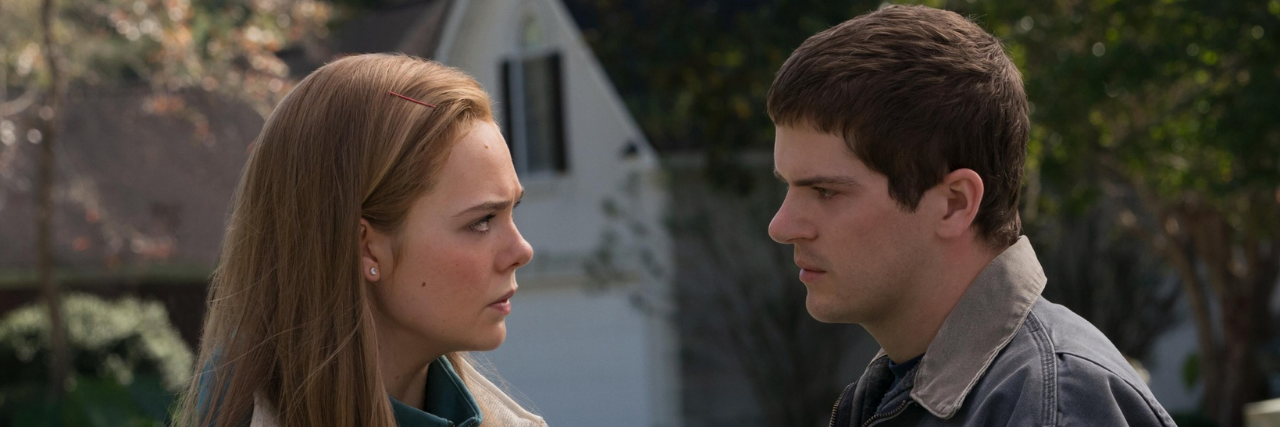What You Should Know Before Watching 'The Girl From Plainville'
Editor's Note
If you experience suicidal thoughts, the following post could be potentially triggering. You can contact the Crisis Text Line by texting “START” to 741741.
This following article contains spoilers for “The Girl From Plainville.” Please proceed with caution (because we don’t want to be the ones who spoil you!)
On March 29, 2022, Hulu released the first episode of its eight-episode limited series “The Girl From Plainville,” a dramatized docuseries that tells the real-life story of Michelle Carter (played by Elle Fanning), a teenager who was convicted of involuntary manslaughter after her boyfriend, Conrad Roy III (played by Colton Ryan), died by suicide.
If the name Michelle Carter sounds familiar, that’s probably because her case drew national attention. Thousands of text messages between Carter and Roy revealed that Carter had encouraged and even urged Roy to take his life. In the end, Carter’s case was the first to hold a person responsible for another’s suicide.
The TV adaptation provides pre- and post-show content trigger warnings for “subject matter related to mental health and suicide” along with contact information for the Crisis Text Line and National Suicide Prevention Lifeline. I was happy to see those reiterated throughout the series. And while it could be assumed people who are watching are familiar with the case — I still think it needed more detailed trigger warnings for a few of the episodes.
As a general rule of thumb, suicide safety guidelines state that depictions of suicide should avoid showing or describing specific suicide methods. Of course, I understand that line gets blurry when it comes to real-life events. From the first episode, the method Roy used to kill himself is revealed — rather understandably so. It was a large part of the case and it’s not surprising they included it. Later, it is revealed Roy had previously attempted suicide. That attempt is shown in episode four, and talked about throughout the series. In my opinion, if you’re going to show a suicide attempt, that should be explicitly stated in the pre-show content warnings.
There’s a difference between “this program shows subject matter related to mental health and suicide,” and “this program shows graphic depictions of suicide.” Talking about suicide and showing a suicide attempt are two vastly different situations, and call for two different responses. As soon as you include a method — especially when showing it, but also when talking about it — you’re informing someone of a way they can kill themselves.
And yes, I’ve heard the reactions a statement like that can get:
“If they’re really suicidal, they’ll find a way.”
“It’s nothing they haven’t heard before.”
“You’re being dramatic.”
But I’ve been the person on the other side of that screen, desperately suicidal. And when I think about the methods I’ve used to attempt suicide and the methods I’ve contemplated — when I trace them back to where I first learned about them, it’s almost always a TV show or movie. Would I have figured something out without having seen those? Yes, probably. But did watching something that flat-out gave me a way to end my life help? No. And was it triggering as hell? Yes.
I suppose knowing how intensely I’ve been struggling with suicidal thoughts lately, I should have known better than to watch a show surrounding a case about suicide. That’s on me. But I didn’t think I would be seeing depictions of suicide and hearing about methods at length. Would a content warning that explained that have stopped me from watching? I don’t know, but that’s not the point. If I did decide to watch, I would have at least known what I was signing up for and could have planned any self-care around that appropriately.
Content warnings are important, “13 Reasons Why” sparked that much-needed conversation, and I’m thankful for that. But frankly, that’s not enough. If the warnings don’t really tell you what they’re warning you about — that’s not helpful. If a suicide method is shown, that needs to be addressed past “the following program shows subject matter related to mental health and suicide.” And I’m not solely calling out “The Girl From Plainville” — that’s true of so many shows and movies. I know there’s a line between “spoiling” a story and informing an audience, but when it’s possible someone’s life could be at risk — there is no line, in my opinion. People’s lives are more important than any TV show or movie.
So, if you are struggling with suicidal thoughts, have attempted suicide, or lost someone to suicide, I would suggest skipping this particular docuseries or watching it with someone who can support you. Your safety and mental health is more important than anything else.
Lead image via The Girl From Plainville’s Official Facebook Page

